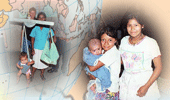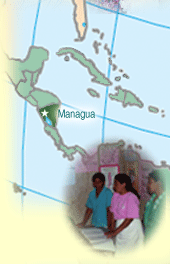
Strengthening Response to Obstetric and
Neonatal Emergencies
Nicaragua has among the highest maternal mortality ratios in Latin America. Over a third of births are attended at home, frequently by a traditional birth attendant (TBA). In the rural Jinotega region, PRIME II worked to build and reinforce linkages among community-based providers, facility-based providers and community members to raise awareness of the danger signs of complicated pregnancies, the consequences of delays in seeking care, and the importance of a prompt response to postpartum bleeding. The project was a collaboration between PRIME and NicaSalud, a consortium of eight international private voluntary organizations and 13 Nicaraguan NGOs formed in the aftermath of Hurricane Mitch to improve the quality and accessibility of maternal and child health services. TBAs and other primary providers received training in community-based life-saving skills, while facility-based providers were trained in basic emergency skills. Community mobilization activities focused on setting up emergency obstetric and neonatal care committees, pooling emergency funds, and establishing transportation plans to ensure women and newborns reach referral facilities quickly in the event of an emergency.
Key Results: The final evaluation demonstrated significant improvement in provider performance. As defined by a quality index score, care of immediate postpartum women by TBAs improved by 87%. Management of postpartum hemorrhage by physicians, nurses and auxiliary nurses improved from 68% to 82%. These positive results for providers were matched by community efforts. Of the 32 project communities, 78% reported the establishment of committees for emergency obstetric and neonatal care. Emergency transportation systems were established in 56% of communities and emergency funds set aside in a quarter. In an illustrative example, emergency funds in one community are administered by a committee, and a community member with a vehicle is on call to transport women to the nearest hospital in cases of an emergency at any hour. A census of pregnant women was prepared in 81% of the communities, and nearly half have implemented birth and complications readiness plans.
Connecting Pharmacists and Youth
Youth in Nicaragua often rely on pharmacies for health care advice, products and services. PRIME II partner PATH implemented a program to train pharmacists and drug sellers to better respond to the reproductive health needs of adolescents. As part of this initiative, PRIME and a local NGO, IXCHEN, employed Integrating Consumer Perspectives tools and feedback mechanisms to facilitate partnerships between youth organizations and pharmacists in Managua. PRIME and IXCHEN trained youth peer counselors to gather feedback from local youth on expectations and then trained pharmacists in sensitivity to youth, communication with youth, and meeting the service needs of youth. A clinical service delivery referral mechanism was also integrated so that the pharmacists could offer a wider spectrum of care. The youth feedback mechanism enables the peer counselors to routinely offer feedback to pharmacists on how well they are meeting youth expectations and needs.
Key Results: To gauge the effectiveness of the project, PRIME trained youth “mystery clients” who were debriefed using a questionnaire after visiting pharmacies in three of the five intervention areas. Almost three quarters of the mystery clients (74%) reported a positive interaction with pharmacy personnel. In 93% of cases, the clients were offered reversible contraceptive options; however, advice on possible side effects and appropriate referrals to other health providers were given less frequently, and encouragement for follow-up through a return visit occurred in only 14% of interactions. Despite the extra effort to train the young consumers, the mystery client technique proved an effective tool for informing program managers.
|











